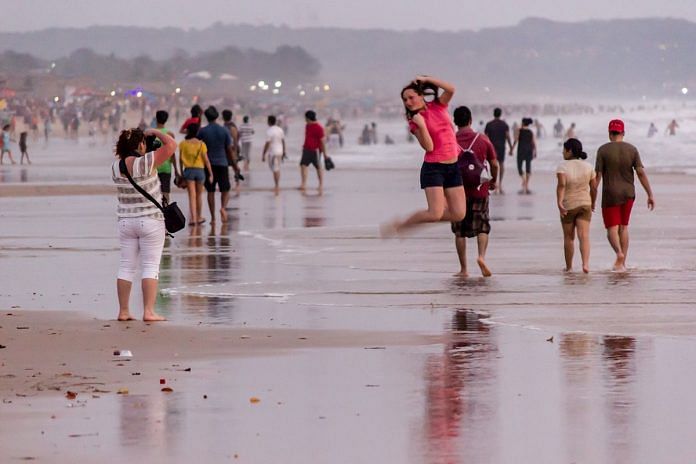New Delhi: To control pollution in coastal beaches, the Union environment ministry has decided to expand its programme of identifying Indian beaches for Blue Flag Certification and is likely to select an additional 20 sites for development this year.
Blue Flag is a voluntary eco-label awarded to “beaches, marinas, and sustainable boating tourism operators”. Denmark-based non-profit Foundation for Environment Education (FEE) awards the trademarked label.
The certification is given if a beach meets 33 stringent criteria under four major heads — environmental education and information, bathing water quality, environment management and conservation and safety and services.
The ministry identified 13 pilot beaches for the certification in July last year: Ghoghla (Diu), Shivrajpur (Gujarat), Bhogave (Maharashtra), Padubidri and Kasarkod (Karnataka), Kappad (Kerala), Kovalam (Tamil Nadu), Eden (Puducherry), Rushikonda (Andhra Pradesh), Miramar (Goa), Golden (Odisha), Radhanagar (Andaman & Nicobar Islands) and Bangaram (Lakshadweep).
Ten of these sites will likely be sent for certification to FEE in the next couple of months, according to Arvind Kumar Nautiyal, Joint Secretary, Environment.
“We are in the process of completing the work in these beaches and will apply for certification in February or March,” said Nautiyal.
He said the plan is to add new beaches to the list every year from now on. “This year, we are looking to add another twenty beaches to list.”
In a notification issued last week, the ministry said for the purpose of Blue Flag Certification, certain developmental activities will be permitted in the Coastal Regulation Zone of identified beaches at a distance of 10 meters from High Tide Line.
These include portable toilet blocks, change rooms and shower panels, water treatment and solid waste management plant, solar power plant, purified drinking water facility, and landscaping lighting, among others, according to the requirements of Blue Flag.
Also read: Bushfires have reshaped life on Earth before, and could do it again
Concerns over impact on local communities
While environmentalists agree that the idea of bringing stringent cleanliness standards to beaches will boost tourism, there are apprehensions that adhering to a European model will end up excluding local communities that rely on beaches for their livelihood.
“Coastal pollution has been an area of concern and to boost to tourism in the country we need cleaner beaches,” said Nivit Kumar Yadav, senior programme manager, compliance monitoring, Centre for Science and Environment.
“The only problem with this is there are chances that such beaches will get leased out to private parties. The moment this is done, the locals who run small businesses will be displaced. Small fishermen will be prevented access to these areas,” Yadav told ThePrint.
In October last year, the Bombay High Court stayed the July notification for Blue Flag certification of the Miramar beach in Goa. The order came over a PIL filed reportedly stating that the certification notification was issued “without a draft notification, public hearing or inviting comments from the public”.
“Going forward, the government needs to discuss how to make sure that the locals who are dependent on these beaches for livelihood are not affected,” said Yadav.
The latest notification allows setting up of entry gates and tourist centres, which will restrict access for locals, he added.
Chandra Bhushan, chief executive, non-profit International Forum for Environment, Sustainability and Technology, said the idea of going for voluntary certification that requires meeting stringent standards is a good idea, since government regulatory bodies have failed to improve the condition of our beaches.
“The time has come for India to use its beaches as prime tourism spots. But the activities in Indian beaches can be very informal, and instead of adopting standards set by Europeans, we should modify the certification system for Indian needs,” Bhushan told ThePrint.
“It would have made more sense to take this in a phase-wise approach, and see how the certification pans out, before expanding the project to more beaches,” he added.
Also read: The 2010s wrecked the planet. But it’s not all over yet



